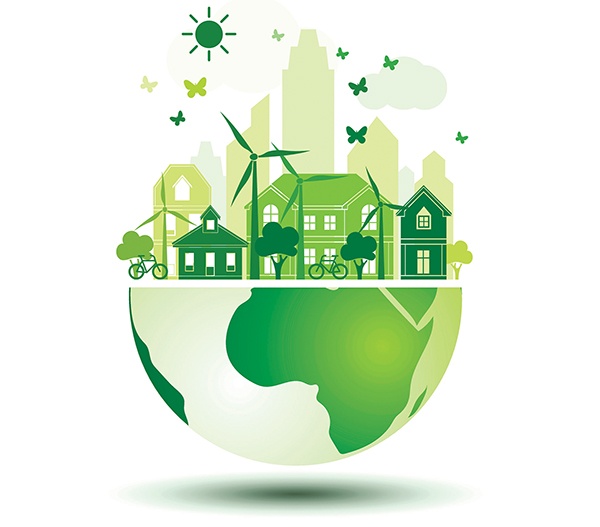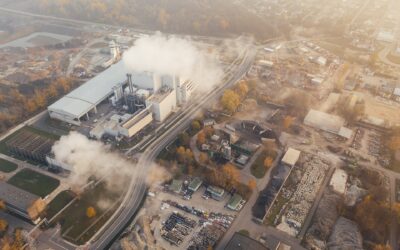Are you more willing to buy products that are certified as carbon-neutral?
In the growing push to reduce carbon emissions and global warming, there’s a rising demand for sustainably-made products with a much smaller environmental impact. And thankfully, many companies and brands are actively working to reduce their greenhouse gasses, and in some cases, offset their carbon footprint entirely.
On the surface, eliminating carbon emissions may not sound like too difficult of a task. After all, today’s companies can purchase carbon offsets or invest in renewable energy with relative ease. But in practice, there are many different systems and processes that must be transformed, including the sourcing of raw materials, manufacturing, packaging, transport, and end-of-life disposal.
To help accelerate this green transition, there are a number of organizations committed to verifying and promoting carbon-neutral products. Working with companies, manufacturers, and carbon offset providers, these independent bodies make it easier for consumers to support sustainable brands and find products without a harmful environmental footprint.
And so, what are the best ways to find carbon-neutral products? And are all brands certified against the same criteria – or are there differences you should know about? Let’s take a closer look and find some answers.
What Is Carbon Neutral Certification?
In the same way that food labels make it easier to find vegan or gluten-free products, carbon-neutral certification gives you the confidence that a given item does not contribute to global warming.
When a brand wishes to attain certification, it will generally work with an independent third-party to measure all emissions associated with its products and then confirm that they have been completely offset or eliminated.
But when it comes to receiving certification, it’s important to understand that the question of carbon neutrality doesn’t always come with a simple “yes” or “no” answer. Instead, certification labels are generally assessed under one of the following two scopes:
- Cradle-to-gate: which covers the total greenhouse gas emissions of a product from the extraction of its raw materials to its production at the point when it leaves the factory. Cradle-to-gate certification is most commonly used for business-to-business (B2B) products.
- Cradle-to-grave: which covers an entire product’s life cycle from the extraction of its raw materials right up to the emissions created during its disposal. Cradle-to-grave is generally used to certify business-to-consumer (B2C) products.
There are a growing number of organizations involved in carbon certification, and, as you may gather, some are more thorough and reputable than others. Assessing a product’s carbon life cycle is no simple task, requiring extensive research and an in-depth analysis of the associated manufacturing, transport, and supply chain networks. In many cases, the harder and more time-consuming it is to receive certification, the more weight there is behind the final badge of approval.
Terrapass has experience helping our clients pursue carbon-neutral certification with Carbon Trust, a leading independent certification body and creator of the very first carbon footprint labeling program.
How Does a Product Achieve Certification?
For a brand to officially certify that one of its products is carbon neutral, it must prove that all of the emissions created during its life cycle have been completely offset or eliminated.
For example, if a shoe manufacturer wants to certify its products as carbon-neutral, it will engage the services of an independent organization to assess its scope 1, 2, and 3 emissions:
Scope 1: Direct emissions
- Fossil fuels used at the factory
- Fuel consumed by company vehicles
Scope 2: Indirect emissions
- Electricity used at the factory
- Fuels bought and used at the factory
Scope 3: Supply chain emissions
- Purchased raw materials and services
- Capital goods, equipment, and machinery
- Upstream (input) emissions from fuel, energy, transportation, and distribution
- Downstream (output) emissions from fuel, energy, transportation, and distribution
- Business travel and employee commuting
In the case of Carbon Trust, it undertakes a comprehensive carbon life cycle assessment (LCA) in accordance with multiple international standards. It then works with the manufacturer to gauge the product’s carbon footprint and develop a pathway towards carbon-neutrality, which typically involves a combination of energy efficiency measures, upgrades to logistical networks, investments into renewable energy, and certified high-quality carbon offsets.
“Our mission is to accelerate the move to a sustainable, low carbon future – today, that means leaders setting net zero pathways and everyone taking steps to reduce their environmental impact.” Tom Delay, Chief Executive, Carbon Trust
As a real-world example, Carbon Trust recently worked with global brand Evian to achieve carbon-neutral certification for its line of bottled water. To meet this ambitious goal, Evian undertook a host of carbon reduction measures, such as:
- Building a new state-of-the-art water bottling facility powered entirely by renewable energy.
- Reducing the carbon-intensity of its logistics network, including the adoption of train networks to replace trucks.
- Increasing the amount of recycled content in its packaging and redesigning existing packaging to use fewer materials.
- Launching new recycling initiatives and pledging to become 100% circular by 2025.
- Purchasing carbon offsets to balance out the brand’s remaining emissions while helping to restore natural ecosystems.
When it comes to carbon offsets, Carbon Trust accepts only those issued by either The Gold Standard or Verified Carbon Standard (VCS), which are also two primary sources we use here at Terrapass. This verification guarantees that the carbon offsets are transparent, permanent, and quantifiable.
What Are the Benefits of Certified Carbon-Neutral Products?
With so many different terms used in marketing these days – such as “carbon neutral”, “sustainable”, “net zero”, and “eco-friendly” – it’s often hard to know exactly what these phrases mean and what the environmental benefits really are.
When it comes to the benefits of certified carbon-neutral products, there are a host of advantages that might not be obvious at first glance:
- Consumers receive a reliable verification that a product and its associated life cycle emissions have been neutralized and no longer contribute to global warming.
- Companies can demonstrate an overall commitment to reducing carbon emissions beyond their individual products. The certification process is often costly and time-intensive, and even if a brand doesn’t certify all of its products, it’s demonstrating a broader commitment to sustainable business practices.
- Certified carbon-neutral products support the development and growth of energy efficient and sustainable technologies, carbon offset projects and cleaner fuels.
- Certification often reduces manufacturing and operating costs through investments in more efficient business processes, which in turn helps to lower consumer prices.
- Brands and companies can embrace the opportunity to better-align with consumer values and set new benchmarks that competitors seek to replicate.
As many of us look for new ways to eliminate our carbon emissions, we can each help the environment through the small choices we make every day. And in addition to using renewable energy, purchasing carbon offsets, and re-thinking our modes of transport, seeking out carbon-neutral products is an immediate way to reduce your carbon footprint – and start a positive ripple effect.
Where Can You Shop for Certified Carbon Neutral Products?
If you want to support climate-friendly products, but you’re not sure where to start, there are many different places you can find verified companies and brands.
Carbon Trust has a comprehensive directory of 1,100 organizations that have received carbon certification, including companies verified as entirely carbon-neutral as well as those working to reduce emissions year-on-year.
Amazon has also started a Climate Pledge Friendly program, which works with third-party certification bodies to identify and promote sustainable products – some of which are entirely carbon-neutral. You can also view the complete list of Amazon’s certification partners to learn more about each organization and the criteria they use to assess products. And while not all products in the program are 100% carbon-neutral – it does represent the growing trend of sustainable retail.
Terrapass created a three-tier carbon badge program to recognize companies who take action to reduce their carbon footprint. The program is available to companies that offset 200 metric tons of carbon dioxide or more. You can view the complete listing on our website, with information about each company and a summary of their activities. And while the criteria for our badging program might not be as strict as that of Carbon Trust – we have a growing list of partners putting significant time and effort into climate change action.
And finally, you should also stay on the lookout for badges and logos on the packaging of food and household items you buy every day. If you see a badge, but you’re not quite sure what it means, you should read the label closely or search for the badge online to discover more about the issuing organization. In many cases, the badge will have a website address or a QR code to provide more information and help you discover additional carbon-neutral products.
In the fight against global warming, it’s encouraging to see so many brands investing significant time, money, and effort into improving their business practices and eliminating their carbon footprints.
At Terrapass, we’re proud to help companies achieve certification through our supply of verified carbon offsets, contributing to an essential part of the process and making it easier for more organizations to reach their environmental goals. With the continued support of brands, manufacturers, verification bodies, and the general public, we hope that in the near future, carbon-neutral products will no longer be the green exception – but the new standard.
Brought to you by terrapass.com
Featured image









